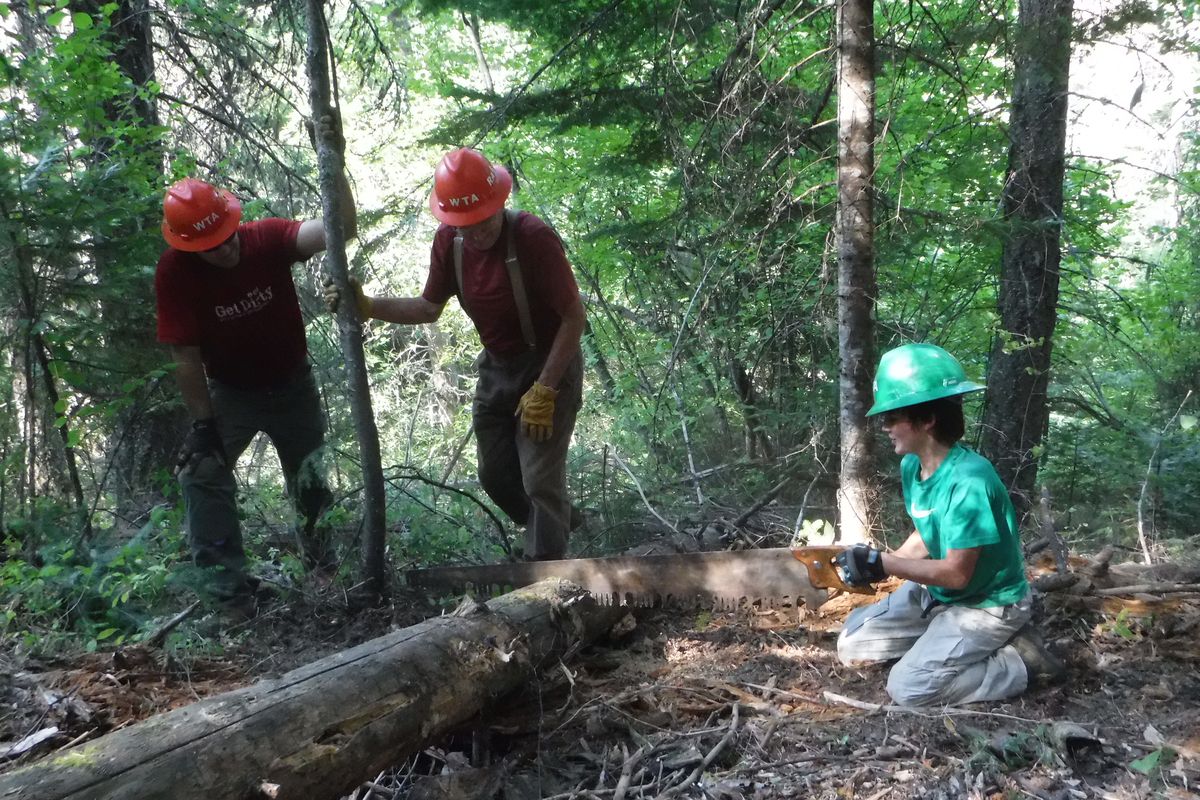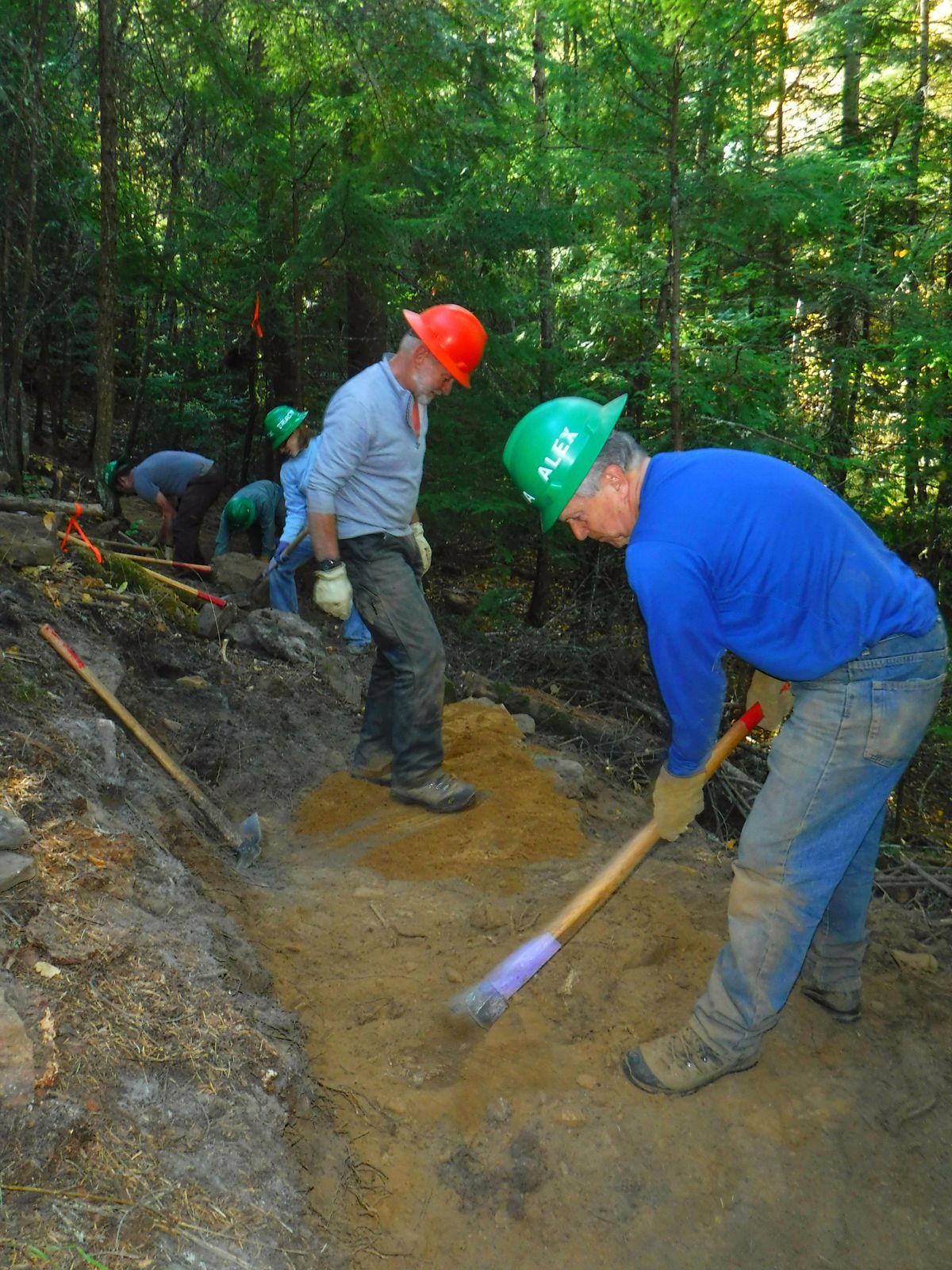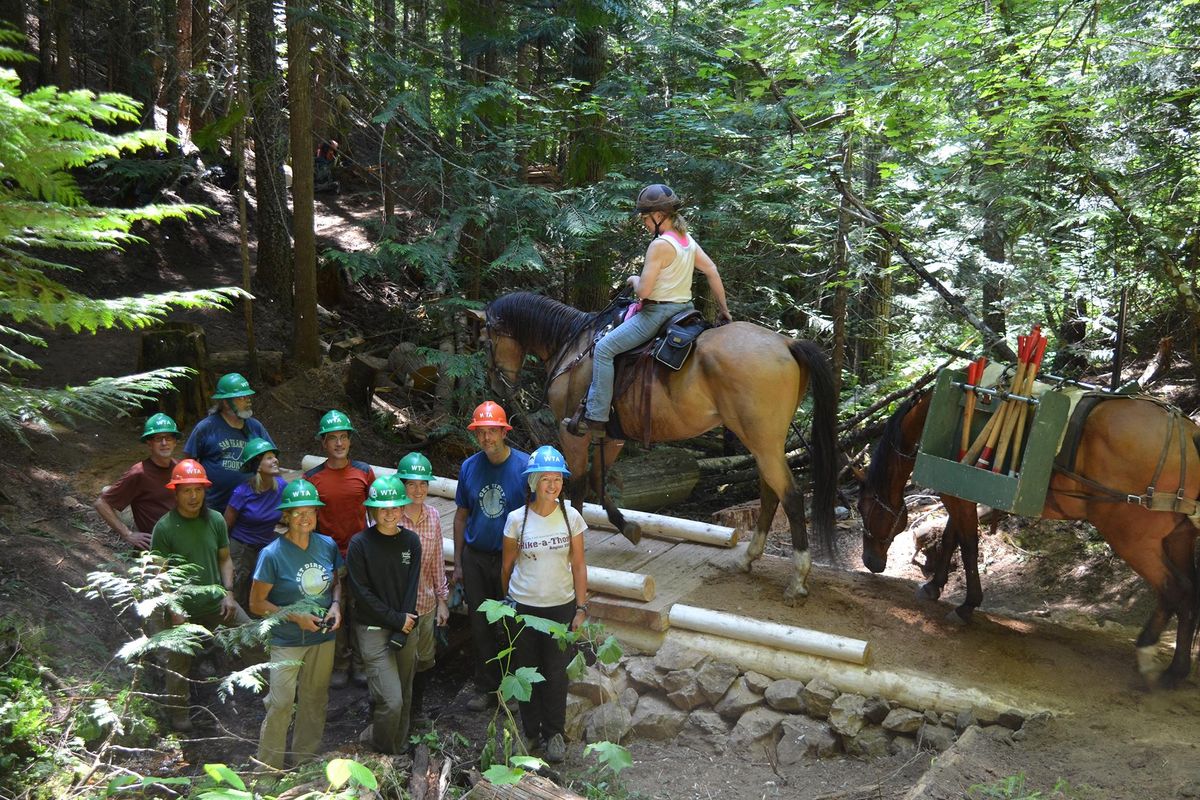Volunteers dig route-building for hikers, bikers, equestrians
Alex Peridian puts his muscle into a trail project on Mount Spokane.
Volunteers generous with their time and muscle have cleared the way for miles of happy hiking, biking, skiing, and horse riding in the Inland Northwest.
Blowdowns were cleared this season, brush was cut, bridges and rock walls were built – all where budget-strapped agencies were falling short.
Trails at Mount Spokane, Riverside State Park and Spokane County conservation areas are among the areas graced by the shovels, bars, saws and pulaskis of citizen work crews this past season.
Plenty of work is scheduled for 2016, and there’s room for more volunteers.
The Washington Trails Association has joined ranks with the Spokane Mountaineers to complete some of the most ambitious projects, including a new route at Liberty Lake County Park.
“This was our most intensive effort to date in Eastern Washington,” said Jane Baker, WTA trail work coordinator, as she walked a new segment along Liberty Creek last week.
“We put in 33 days of effort on this route between April 18 and the end of October to upgrade an existing user trail and build a mile of new trail.”
Dealing with the rocky hillside was tedious.
“We totaled 2,700 hours of volunteer labor, had a whole lot of fun and moved a lot of rocks,” said Holly Weiler, WTA’s Eastern Washington coordinator.
The effort has created a new trail on one side of the creek that parallels the main trail on the other side of the creek.
Users can go up one trail to the cedar grove, a popular destination, and return to Liberty Lake trailhead on the other trail to enjoy a 4-mile loop.
“The volunteers who put their sweat into this trail will see the rock walls and drainage structures and remember every boulder they moved with a bar and set into place,” Baker said. “It’s their badge of honor.”
Paul Knowles, Spokane County Parks planner, offered praise to WTA and a name for the new trail.
“I had an opportunity this past weekend to hike the new Split Creek Trail out at Liberty Lake and … it is spectacular,” he said. “Really, one of the more beautiful trails that we’ve seen built since our partnership with WTA began seven years ago.
“The trail that has been built affords ample views of the creek and provides a diverse range of experiences. People will love this trail.”
Seattle-based WTA tapped 4,054 volunteers who logged 130,000 hours of service across the state in 2015, making it the largest volunteer-based trail organization in the country. The group will celebrate its 50th anniversary in 2016.
WTA’s East Side coordinators Baker and Weiler drew from a pool of 200-300 volunteers this year to generate 5,745 hours of service during 107 project days.
Every volunteer is highly valued, Weiler said, “but some of them really get into trail work.”
Baker, over her 10 years of involvement with WTA, has led 250 work parties from Spokane to the Salmo-Priest Wilderness.
“I first got involved with trail work when I moved here from Ohio and wanted to see new places and meet good people,” she said, noting that WTA and groups like the Sierra Club organize working vacations in spectacular wilderness areas.
Denise Beardslee and Lynn Smith received WTA awards this year for logging 100 work parties over several years.
Alex Perdian, a Spokane fiction writer, has been Eastern Washington’s most generous WTA volunteer this season, devoting 44 days to work parties over the past four months.
Although he loves to go hiking, he said the notion of giving back to routes he traveled never occurred to him until a few years ago when he passed Spokane Mountaineers volunteer trail crew led by Smith.
“I jumped into it and found I liked it,” he said. “It’s work but also a fun way to give back.”
Perdian said he got even more involved with WTA after doing a little research and learning how little money was available to local, state and federal agencies for trail work.
“In a lot of cases, if volunteers don’t step up, the necessary work isn’t going to be done,” he said.
For example, the Colville National Forest did not have a fully dedicated trail crew this year as it’s had in the past, said Franklin Pemberton, forest spokesman.
Statewide, the workload is huge.
The Duckabush Trail in Olympic National Park was smothered this spring in snags that fell in a burned area. WTA volunteers cleared 300 blowdowns to open the trail. This fall, a big storm dropped another 80 blowdowns prompting extra crews to respond again.
“That’s just one trail in the state,” said Karen Daubert, WTA executive director.
“I work from home,” Perdian said, “so I enjoy trail work for the physical exercise.”
Unlike going to a gym, he said, trail work is a full-body workout that results in something tangible that serves a purpose.
“The bonus is the people you meet,” he said. “Trail volunteers are all great people. On the weekday projects you meet mostly those who are self-employed or retirees. On the weekend projects, you’re likely to meet younger people.”
Keenan Dunfield of Spokane is WTA’s youngest volunteer this year to work on a minimum of five projects and earn a personalized green hard hat.
At age 9, he found great pleasure in working in the dirt and reaping the rewards of post-project cookies and a full can of pop all to himself.
Keenan’s father, Todd Dunfield, is among 10 volunteers across the state to receive WTA’s 2015 “Above and Beyond Award.” Dunfield has been involved with WTA for years and recently was named executive director of Spokane Nordic Ski Association, a cross-country ski trail advocacy group that’s working this weekend to help clear hundreds of windstorm blowdowns at Mount Spokane State Park.
Keenan was welcomed on trail work parties this year because WTA has been working to incorporate youths into their program. Young workers age 10-15 must be with their parents while special groups are organized for teens.
“I think WTA really gets how youth are the next generation of trail users and trail stewards,” Dunfield said.
“I’m not sure I had more time to devote to trail work this summer, but I made more time,” he said. “I don’t regret it. Keenan used to see me go mountain biking and then ask if he could go the next time. Now he wants to join me on trail work crews.”
WTA crews this season built nifty spur off the Knothead Trail to overlooks of the Little Spokane River. Although a wildfire burned the area this summer, the trails are destined to be local classics.
“I joined a couple of work parties at Knothead, then I missed a few, and when I came back I saw how much the other volunteers had accomplished,” Dunfield said. “That really energized me. People with hand tools can get a lot done.”
WTA sometimes joins forces with other agencies or groups to get more bang for their buck. During a four-day project on the Red Bluff Trail near Sullivan Lake this summer, WTA built a bridge in partnership with Back Country Horsemen of Washington and the Pacific Northwest Trail Association.
Darrell Wallace and Kristy Stender used their horses to pack in 300 pounds of tools over several miles in 100-degree temperatures.
“We want our volunteers to arrive full of energy, not whipped from packing in all those tools before they even start to work,” Wallace said.
Other WTA projects in this region this summer included two days in the Salmo-Priest Wilderness, three days on Sullivan Lake Shoreline Trail, four days at Fishtrap Lake, five days on Iller Creek Conservation Area in Spokane Valley, six days on Knothead Trail and 12 days on Mount Spokane.
Weiler has collected the truckload of tools used by East Side volunteers this year and will be repairing them and using a grinder for sharpening during the winter to get them ready for a new round of trail projects that could get started as early as February.
Projects in 2016 will include Antoine Peak Conservation Area, Liberty Lake, Fishtrap Lake, Mount Spokane and Mica Peak.




